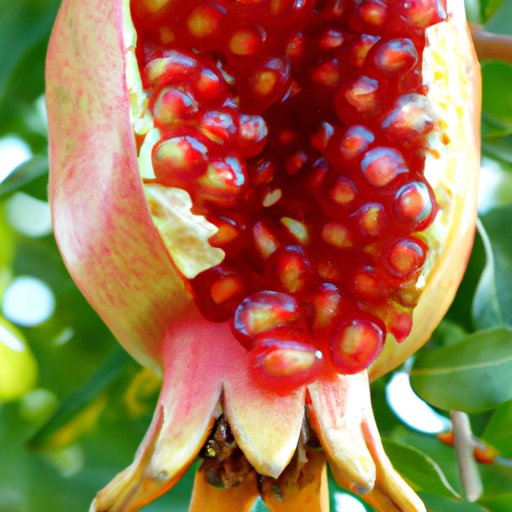
Introduction
Pomegranate is a delicious and nutritious fruit that is quite popular across the globe. However, many people often find it challenging to eat pomegranate seeds. Fortunately, in this article, we’ll explore a step-by-step guide on how to eat pomegranate seeds and enjoy their numerous health benefits.
Step-by-Step Guide
There are several ways to cut open a pomegranate. But before cutting the fruit, make sure it is ripe and juicy. Look for fruits with smooth skin and a deep red color. The following is a step-by-step guide on how to cut and extract the seeds:
- Cut off the top and bottom of the pomegranate fruit.
- Cut the skin of the fruit around the ridge from top to bottom, but do not cut through the fruit entirely.
- Gently pull the fruit apart, separating it into halves.
- Hold the pomegranate over a bowl and gently tap the rind with a wooden spoon or your hand to release the seeds.
- Remove any residual skin covering the seeds.
Be careful not to spill juice on your clothes or surroundings. You can also try this method underwater to avoid the mess.
Storing Pomegranate Seeds
Pomegranate seeds can be stored in a container in the refrigerator for 3-5 days. You can also freeze them for up to six months.
Health Benefits of Eating Pomegranate Seeds
Pomegranate seeds are not only delicious but also packed with numerous health benefits. Each pod of seed is loaded with antioxidants, vitamins, and minerals. Here are some of the health benefits:
- Pomegranate seeds contain a high concentration of antioxidants such as flavonoids, punicalagins, and ellagic acid. These antioxidants help prevent cell damage, reduce inflammation, and lower the risk of chronic diseases like heart disease and cancer.
- They are also a good source of vitamins, including vitamin C and K, which boost our immune system, improves bone health, and helps to regulate blood sugar levels.
- Pomegranate seeds are high in fiber, which helps improve digestion, maintain healthy gut bacteria, and prevent constipation.
Using Pomegranate Seeds in Food Recipes
Pomegranate seeds can be used to add a pop of flavor and texture to various recipes. The following recipes are excellent examples:
- Pomegranate Salad Dressing: In a small bowl, whisk olive oil, honey, pomegranate juice, and salt. Drizzle over your favorite salad.
- Pomegranate Smoothie Bowl: Blend frozen banana, Greek yogurt, pomegranate seeds, and honey. Top with granola, more pomegranate seeds, and sliced banana.
- Pomegranate Fruit Salad: Mix diced pineapple, kiwi, banana, and pomegranate seeds. Squeeze fresh lime juice over the fruit salad and sprinkle with mint leaves.
These recipes are not only tasty but also packed with essential nutrients that are beneficial to our health.
Growing Your Pomegranate Tree
If you are interested in growing your pomegranate tree, the following is a guide on how to get started:
- Choose the right location- Pomegranate trees thrive in full sun, well-drained soils, and warm climates.
- Buy a healthy tree and dig a hole twice the size of the root ball.
- Add compost and organic fertilizer to the soil and plant the tree in the hole.
- Water the tree regularly and mulch the base to conserve moisture.
- Remove any suckers and prune the tree to maintain its shape and size.
Growing your pomegranate tree is an excellent way to enjoy fresh, organic, and nutrient-rich fruits while also promoting environmental benefits such as conserving energy and reducing carbon footprint.
Pomegranate Varieties
There are several pomegranate varieties, each with a unique taste, texture, and nutritional value:
- Wonderful: This type is the most commonly grown for commercial purposes and has a sweet, juicy flavor.
- Grenada: It has a tartness flavor, and its seeds are bright red in color.
- Akko: This variety is known for its big and soft seeds that are perfect for juicing.
Conclusion
In conclusion, pomegranate seeds are a delicious and nutritious fruit that is easy to eat when you follow the step-by-step guide. Eating pomegranate seeds provides numerous health benefits, and incorporating them into your meals is a great way to boost your health. Growing your pomegranate tree is also a fantastic way to access fresh, organic fruits while promoting environmental conservation.





